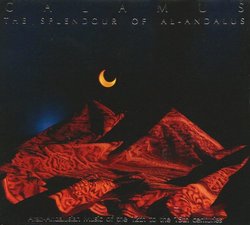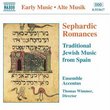| All Artists: Milcho Leviev Title: Bulgarian Piano Blues Members Wishing: 1 Total Copies: 0 Label: M.a. Recordings Original Release Date: 1/1/1994 Re-Release Date: 10/1/1995 Genres: International Music, Jazz Style: Number of Discs: 1 SwapaCD Credits: 1 UPC: 739978002623 |
Search - Milcho Leviev :: Bulgarian Piano Blues
 | Milcho Leviev Bulgarian Piano Blues Genres: International Music, Jazz
This collection of Andalusian pieces is MA's best selling title. Features music from the mid-7th through the 15th century in the southern area of Spain controlled by Muslims originally from North Africa and as far away as ... more » |
Larger Image |
CD DetailsSynopsis
Album Description This collection of Andalusian pieces is MA's best selling title. Features music from the mid-7th through the 15th century in the southern area of Spain controlled by Muslims originally from North Africa and as far away as Iraq. Similar CDs
|
CD ReviewsSuperb musical glimpse at an important corner of history. B. Marold | Bethlehem, PA United States | 09/21/2005 (5 out of 5 stars) "`Danzas Medievales Espanolas' and `Calamus, The Splendour of Al-Andalus' are both performed by the Eduardo Paniagua Group which, I believe, is based in Spain. Both albums were recorded at the Monasterio de la Santa Espina, Valladolid, Espana and both ensambles of musicians are lead by Eduardo Paniagua, although there is some difference in the personnel between the two albums. Andalucia is the most southwesterly province in Spain and therefore the one under control of the Moors for the longest time. The latter of the two albums specifically offers us music of `Arab-Andalusian Music of the 12th to the 15th centuries', after which the Moors were kicked out of Spain by Isabella and Ferdinand. As I listen to this specifically Arab music, I hear virtually nothing which tells me that it is music performed in Spain. It is certainly old, but not too different from the Arab music I hear on Sunday's on my local NPR radio station. You can almost hear the influences of the Levant which are shared by both Arab and Israeli musical styles. I am constantly looking around to find the sources of all the clicks and rattles as I do my gardening with Walkman in full throat. Turns out, it is all from the rich family of Middle Eastern percussion instruments on this album. Looking at the names of the tracks, they too all seem to be in a Latinized spelling of a Middle Eastern language. The first album of Medieval dances with largely the same instruments and a very similar ensemble sounds quite different. This music is quintessentally European Renaissance, with strong similarities to other recordings of Renaissance music by French, English, Dutch, German, and Italian influenced performers. The titles to these pieces have a much more pronouncedly Spanish look to them. Some even seem to be titled in Latin, which seems odd, but maybe not that odd, as the two strongest influences on popular music through the ages is dance and liturgical (nee gospel) music. So, one shouldn't be too surprised to see a little Kyria slip into the vernacular. One thing which really impresses me is that while western music has changed so much over the last 6 centuries, the Arab music sounds so much like it does today, and yet in the 15th century, it sounds a lot more sophisticated than the native European music. I highly recommend both albums, but if you are really on the lookout for `something completely different', go for the Arab music of Al-Andalus!. " If you are in that Spanish Renaissance mood this is perfect cloudia | Seattle, WA United States | 06/10/2002 (5 out of 5 stars) "Very well captures the mood of eras and places Spanish and Renaissance though the lyrics seem to actually be Arabic, which is appropriate. Reminds me a great deal of the brilliant Madredeus though this has a considerably more Elizabethan sound, more pastoral and less dramatic and operatic. A good number of songs here, so the CD will give you something to listen to for awhile." Memories of Al-Andalus Pater Ecstaticus | Norway | 09/27/2005 (5 out of 5 stars) "It all began almost three years ago... I was travelling by aeroplane from Brussels to Madrid, and from there, by train, to Sevilla. This train journey in itself offered me moments of incredibly new and exotic landscapes that touched my soul in ways I could never have imagined. The city of Madrid gave way to the agglomeration -- the agglomeration gave way to a rural patchwork of different landscapes -- and then one of the most incredible sights: orange orchards as far as the eyes could see, stretched over the gently rolling landscape of grass-covered hils with a small stream here and there and between the trees, grazing on the grass, were white cows so very different from Friesian, black and white cows I am used to in Holland. This incredibly romantic landscape slowly transformed, as we came closer and closer to Sevilla, in the drier, more widely rolling landscapes with a beautiful castella here and there, perched on a high cliff or on a high rock in the middle of the valley. Astounding exoticism for a Dutchman who had never been more southernly than Paris...
We went along to see and hear and feel - to take in to the full - all possible sights and sounds and tastes of Andalucia. I had fallen in love with Andalucia, the incredibly poetic Alhambra and especially with Sevilla and all of its magnificent buildings, its river dividing the city in two, its flauntingly prosperous Cathedral with Columbus' mausoleum, its sympathetic, winding balconied streets, its intoxicatingly romantic Jardines del Alcazar that I wish I never had left, its deep history of many peoples meeting each other in war and trade. It was there, in the Alcazar - the palace where Columbus himself came to report to the emperor and empress about his travels to the new World - that I bought this album. As such, for me it is inextricably tied to memories of the utmost romanticism. Maybe not the best way to objectively judge an album on its merits as a document of accurate musical historicity. But the damage has been done. Another human being has given in to romanticism and lost part of his soul to another corner of the world." |

 Track Listings (10) - Disc #1
Track Listings (10) - Disc #1



